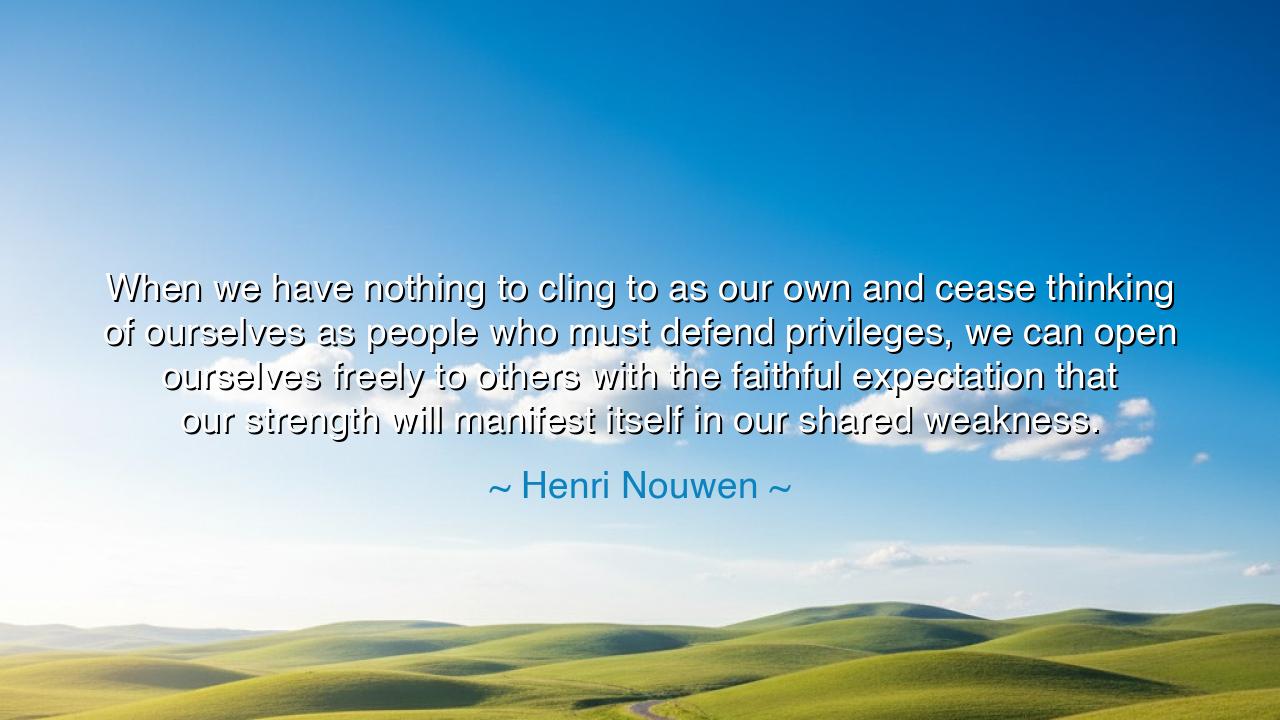
When we have nothing to cling to as our own and cease thinking
When we have nothing to cling to as our own and cease thinking of ourselves as people who must defend privileges, we can open ourselves freely to others with the faithful expectation that our strength will manifest itself in our shared weakness.






Henri Nouwen, the gentle priest and guide of souls, once spoke with the voice of timeless wisdom: “When we have nothing to cling to as our own and cease thinking of ourselves as people who must defend privileges, we can open ourselves freely to others with the faithful expectation that our strength will manifest itself in our shared weakness.” In this utterance lies a paradox radiant with truth: that only when we release the weapons of pride and the armor of privilege can we embrace others fully, and only in confessing our weakness do we discover the hidden wellspring of true strength.
The meaning of these words is a call to humility and communion. Nouwen teaches that as long as we are bound to defending what is “ours”—possessions, status, privilege, reputation—we are closed off from others, locked behind the walls of self-protection. But when we let go, when we cease to defend ourselves as separate and superior, we become free to meet others in their humanity. And in that meeting, in the honesty of shared weakness, we discover a strength far greater than any that self-reliance alone could grant. It is the strength born of solidarity, of compassion, of vulnerability met with vulnerability.
The origin of this wisdom lies in Nouwen’s own journey. Though a scholar of theology, he chose to leave the halls of prestige and spend his later life serving in a community of men and women with profound disabilities at L’Arche. There, he learned that the truest form of power was not the privilege of intellect or position, but the capacity to be present in weakness—his own and that of others. In that place, where no one boasted of strength, he found a love and resilience that exceeded anything born of worldly success. His words echo that lived experience: strength is not conquered in isolation, but discovered in shared fragility.
History provides vivid testimony to this truth. Consider the life of St. Francis of Assisi. Born into wealth and privilege, he cast aside his inheritance, renounced all claims of defense, and chose instead to embrace poverty and weakness. And yet, in that surrender, he found a strength that inspired countless others and continues to shape the world centuries later. Or think of Mahatma Gandhi, who forsook privilege and power, meeting his people not as master but as fellow sufferer, and through shared weakness forged a strength that shook an empire. These lives show that surrender of privilege can open the gates to a strength rooted not in dominance, but in solidarity.
The imagery of Nouwen’s words is beautiful and unsettling: “our strength will manifest itself in our shared weakness.” To the proud, this seems folly. How can weakness reveal strength? Yet consider: when one person admits their vulnerability, another dares to do the same. Barriers fall, hearts open, and in this shared honesty, a bond is forged stronger than steel. Alone in weakness, we may fall; together in weakness, we rise. For strength is not the absence of weakness, but the courage to embrace it together, trusting that in mutual openness, grace will manifest.
The lesson for us is clear: let go of the illusion of self-sufficiency. Cease clinging to possessions, honors, or privileges as shields of identity. Instead, dare to meet others in honesty, even when it means confessing fear, struggle, or need. In this vulnerability, you will find not shame but communion, not despair but shared resilience. The paradox of life is that the more we cling to our own, the weaker we become; the more we give and open, the stronger we are together.
Practically, this means seeking spaces where honesty is valued over appearances. In families, friendships, and communities, speak with openness about struggles. Refuse the urge to compete for superiority or to guard privilege at the expense of relationship. Instead, extend compassion and allow others to extend it to you. For in the weaving of such bonds, your life will grow strong, not in isolation, but in unity.
So let Henri Nouwen’s words resound through the generations: true strength lies in shared weakness. Do not cling, do not defend, but open yourself freely. In the surrender of pride and the embrace of vulnerability, you will find a power more enduring than privilege—the power of love, the strength of communion, the invincible bond of humanity.






AAdministratorAdministrator
Welcome, honored guests. Please leave a comment, we will respond soon